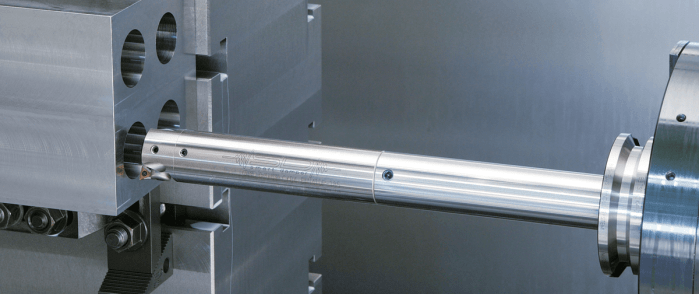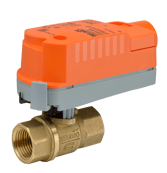Types of Sockets and Their Uses
Hand Tools
A good technician will have all of the sockets he or she needs in the shop. Depending on your industry, that might be a set of 6-point sockets in metric or several sets of various points in SAE and metric, along with some of the specialty sockets.
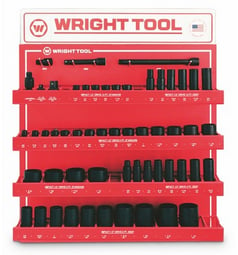
Wright Tool D953 55-piece 1/2″ Drive Standard and Deep Impact Set
Abolox carries sockets by known brands that are made of quality materials designed for professional use. Browse through our socket listings to find the sockets you need, whether you need an entire set or to replace sockets that disappeared – you know, like those elusive 10mm sockets that seem to grow legs and hide every time you need one.
4-Point and 8-Point Sockets
Four-point sockets are rarely used anymore, but they were common in antique automobiles. They fell out of favor in the 60s. However, you can still find some 4-point fasteners on some of the older vehicles. Newer vehicles have plastic fasteners for trim that may be 4-point fasteners. You’ll cause less damage to them if you use a 4-point socket instead of a wrench.
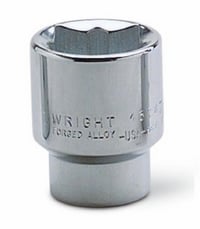
Wright Tool 4340 1/2″ Drive Chrome Standard Socket 8 Point SAE 1-1/4″
You can use an 8-point socket on a 4-point fastener. However, the socket walls are thinner, so they shouldn’t be used on larger 4-point fasteners or stuck fasteners. Or, if you have a soft fastener or one that has rounded edges, an 8-point socket may be able to remove the fastener – in the case of a soft fastener, without damage. In the case of a damaged fastener, the extra points may get a better grip on the fastener.
Some older furniture and pipe plugs also use four-point fasteners, which you can use 8-point sockets on.
5-Point and 10-Point Sockets
Five-point sockets are those used in gas, electric and water fields rather than on automobiles or homes. They are used as tamper-resistant fasteners because they don’t have two sides that are opposite. You can’t get a wrench on them to remove them. Ten-point sockets have thinner walls than a 5-point socket, but they allow you to “grab” the fastener from more angles.
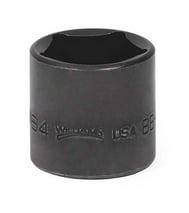
Williams JHWBB-526 3/8″ Drive Black 5-Point Penta Socket
Other places you can find 5-point fasteners are on manhole covers, valve boxes, ground vaults, meter boxes, waterworks, fire hydrants and electrical junction boxes. They are sometimes referred to as Penta sockets or buffalo cover sockets.
6-Point and 12-Point Sockets
Six-point sockets come in SAE or metric and are the most common sockets. Almost all fasteners have six points, except for specialty fasteners. Six-point sockets have thicker sidewalls than 12-point sockets.
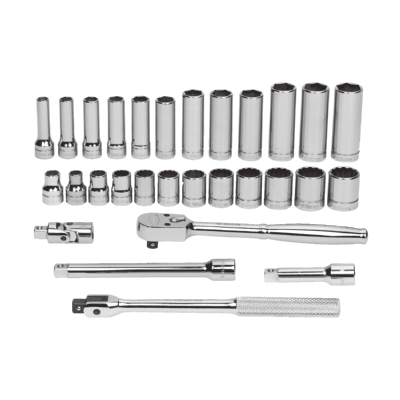
Williams JHWMSB-29F Metric Socket and Drive Tool Set 3/8″ Drive Set 29 Piece Tool Set Only 6 & 12 Point
You might use a 12-point socket if you have very little room to fit a socket or if the fastener is in such tight quarters that you can only turn the ratchet very slightly. A 12-point socket allows you to position the ratchet so you can turn it farther in tight quarters.
Torx Bit Sockets
Torx screws and bolts were invented in 1967 by Camcar Textron as an alternative to Phillips screws and bolts. While a Phillips head will strip easily, a Torx head doesn’t. Torx screws and bolts have six points with vertical walls as opposed to a Phillips, which has four points and slanted walls. Thus, Torx fasteners are less likely to fail, especially when applying high torque.
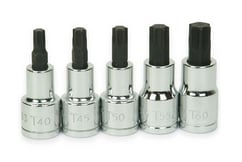
Williams JHW32908 Torx Bit Socket Set 1/2″ Drive 5-Pieces Metric
Hex Sockets
Hex bolts have an inset hex-shaped insert on the top of the fastener. You need hex wrenches or hex bit sockets, sometimes referred to as Allen wrenches or sockets, to remove them. Hex bolts are common in automotive applications, especially with torque-to-yield bolts like some manufacturers use for head bolts.
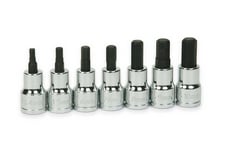
Williams JHW31904 Hex Bit Socket Set 3/8inch Drive 7 Piece Metric Standard
Hex sockets may be one or two pieces. If a hex socket is two pieces, you can remove the six-sided bit and replace it without buying the whole socket.
Impact Sockets
Impact sockets have thicker walls than regular sockets and are made to withstand the rigors of an impact gun. They are used for larger bolts and tire studs. Impact sockets come in SAE and metric sizes but are mostly 6-point sockets. The more points a socket has, the less strength it has. An impact gun could easily strip an 8-point or 12-point socket.
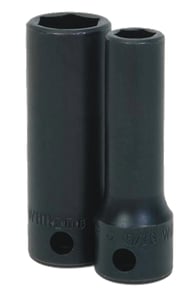
Williams JHW12M-608 3/8″ Drive Deep Impact Socket 6-Point METRIC 8 mm
Spark Plug Sockets
Spark plug sockets come in two sizes: 13/16 and 5/8. They usually have a rubber insert that holds the spark plug in the socket and are six-sided. You can purchase regular spark plug sockets or those with thinner walls for applications where the plug nut is inset into the head.
Insulated Sockets
When working with electrical applications, you should use insulated sockets. The outside of the socket has insulation to protect the user from getting shocked.
Lighted Sockets
Sometimes – usually on vehicles – fasteners are under or behind other things on the engine that block the light. A lighted socket has a small battery-powered light that turns on when you press a button or put it on a ratchet. They can help you find that elusive bolt hiding in the dark recesses of an engine.
Pass-Through Sockets
A pass-through socket has a hole in it to allow long studs to pass through the socket and ratchet.
Bolt Grip Sockets
Bolt grip sockets have slanted “points.” They are never used to tighten a fastener – only to remove a damaged fastener. The slanted or angled points do not actually come to a point. They grab the damaged fastener in a diagonal manner, which helps keep the socket from stripping the bolt even more.
Drive Sizes
Ratchets and sockets have different drive sizes. The larger the drive, the more torque you can put on the ratchet and socket without damaging the tools or the fastener.
Ratchets and sockets most commonly come in 1/4-inch drive, 3/8-inch drive, 1/2-inch drive, 3/4-inch drive and 1-inch drive. Impact sockets are available in 1/4-inch drive, 3/8-inch drive, 1/2-inch drive, 3/4-inch drive and 1-inch drive, but they are also available in drive sizes 1-1/2-inch, 2-1/2-inch and 3-1/2-inch for large industrial applications.
Deep-Well vs. Standard Sockets
The standard sockets are more common. However, some applications have longer studs, which require deep-well sockets. The socket walls are taller, which allows you to get the nuts of the longer studs.
Deep-well sockets are usually stronger than standard sockets, so if you need to put more torque on a standard bolt to get it unstuck, you might use a deep-well socket.
Deep-well sockets come in all of the same sizes and drives as regular sockets, including SAE and metric, ¼-inch drive, 3/8-inch drive, ½-inch drive, ¾-inch drive and 1-inch drive.
Sockets at Abolox
When you need to build up your socket sets or replace lost sockets, you’ll find quality sets and individual sockets at Abolox. Shop our pages to find the sockets you need, including Torx sockets and hex bit sockets. We carry all drive sizes, regular and impact sockets, and many specialty sockets. All the socket, ratchet and extension brands we carry are known brands that use quality materials during the manufacturing process.
